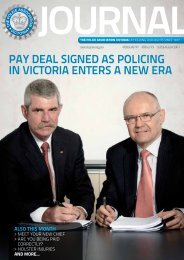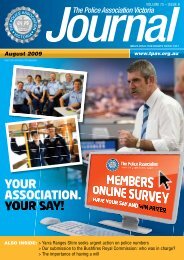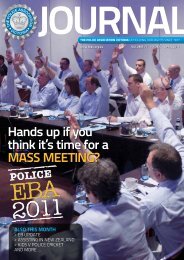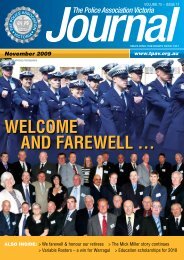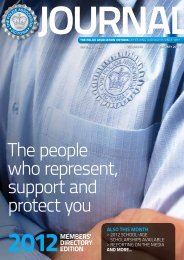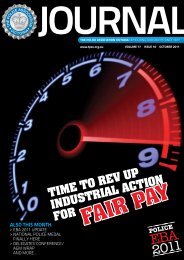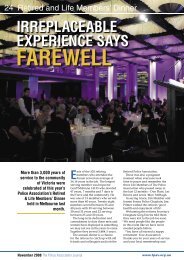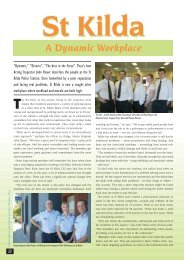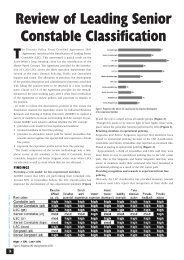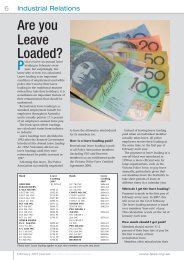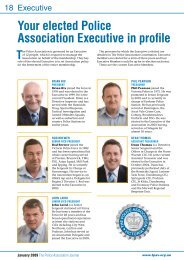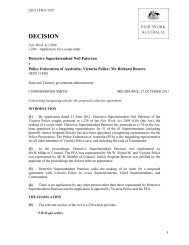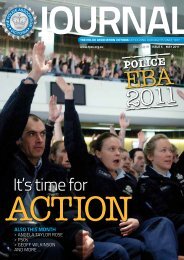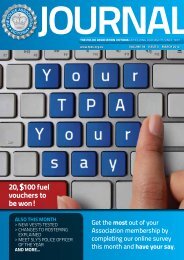June edition - The Police Association Victoria
June edition - The Police Association Victoria
June edition - The Police Association Victoria
You also want an ePaper? Increase the reach of your titles
YUMPU automatically turns print PDFs into web optimized ePapers that Google loves.
IR News<br />
Members win on excess<br />
travel and BOCC<br />
Chris KennEDy ><br />
INDuSTRIAL RELATIONS<br />
MANAGER<br />
Excess Travel<br />
Fair Work Australia has agreed with a <strong>Police</strong><br />
<strong>Association</strong> submission that members<br />
must be reimbursed when they are forced<br />
to drive their own vehicle when there is<br />
no direct transport available when attending<br />
a training course.<br />
<strong>The</strong> <strong>Association</strong> recently took the Force<br />
before Fair Work Australia after it refused<br />
to pay excess travel time and costs to a<br />
member attending a training course, despite<br />
the current Agreement clearly stating that<br />
members have a right to be reimbursed for<br />
using their own vehicle where no direct rail<br />
or bus service is reasonably available.<br />
<strong>The</strong> Force argued that a direct rail service<br />
could comprise multiple forms of transport<br />
and that members need authorisation to<br />
take their own vehicle, even where there is<br />
no direct service available for the member to<br />
get to training or a temporary work location.<br />
In Fair Work Australia’s view a direct service<br />
is defined as a single journey on a single<br />
mode of transport and a single taxi trip. In<br />
this case, the member can be reimbursed<br />
by a first class fare and a taxi voucher. If a<br />
direct service is not available, the member is<br />
entitled to use their own vehicle and receive<br />
the kilometre rate.<br />
For example, a member travelling from<br />
Ballarat to the Academy could be given a rail<br />
fare from Ballarat to Southern Cross and a<br />
taxi voucher for the trip from Southern Cross<br />
Station to the Academy should these modes<br />
allow the member to arrive at the Academy<br />
in time for the course. If it does not, the<br />
member is entitled to use their private<br />
vehicle or could be rostered to travel during<br />
work time on the previous day.<br />
In all cases, excess travel time is also<br />
payable if it meets the criteria set out in the<br />
current employment agreement.<br />
Excess travel is payable where the training<br />
or temporary work location is more than<br />
24 km (as the crow flies) from your station<br />
in metropolitan areas or more than 50 km<br />
or 40 minutes drive in country areas.<br />
If you have any questions or require<br />
assistance, please contact the Industrial<br />
Relations Section at the <strong>Association</strong>.<br />
BOCC successes<br />
A sworn police presence has been retained in<br />
the <strong>Victoria</strong> <strong>Police</strong> Force’s Welfare and Multimedia<br />
Units following a successful bid by the<br />
<strong>Police</strong> <strong>Association</strong> to avoid these areas from<br />
further civilianisation by the BOCC project.<br />
Under BOCC project plans, the Welfare<br />
Unit was earmarked to lose three sworn<br />
members to civilians. Moreover, the decision<br />
was made without consultation with the<br />
members or managers concerned<br />
With the assistance of the <strong>Police</strong><br />
<strong>Association</strong>, affected members submitted<br />
grievances, arguing that it was essential for<br />
welfare officers to be sworn so as to better<br />
connect with members and to gain access<br />
to crime scenes and areas where members<br />
would require assistance.<br />
When <strong>Victoria</strong> <strong>Police</strong> rejected these<br />
arguments, the matter was then referred to<br />
retired police superintendent Trevor Parks to<br />
arbitrate the matter.<br />
<strong>The</strong> <strong>Association</strong>’s principle argument in this<br />
case was that sworn members that occupy<br />
positions at Welfare are required to possess<br />
expertise, which can be acquired only<br />
through actual field experience as a sworn<br />
police officer. This is in line with Force policy.<br />
Members in need of Welfare assistance<br />
need to be able to talk to a member<br />
who has shared their experiences and<br />
can understand without having to have<br />
policing explained to them. It is why<br />
members at the Welfare unit have always<br />
mainly been sworn. If the BOCC proposal<br />
was implemented, the high quality<br />
service provided by the Welfare Officers<br />
would be lost.<br />
<strong>The</strong> arbitrator agreed with the <strong>Police</strong><br />
<strong>Association</strong>. <strong>The</strong> win will ensure that the<br />
Force will continue to provide a robust<br />
and relevant welfare response staffed<br />
by members who have experienced<br />
police work.<br />
<strong>The</strong> <strong>Association</strong> was also successful in<br />
the BOCC arbitration for the Multimedia<br />
Unit. Again, we demonstrated that<br />
members need to have experienced being<br />
a sworn member to be able to create<br />
training materials about the roles and<br />
responsibilities of sworn members.<br />
Unfortunately our submissions in the<br />
Academy Security and Field catering units<br />
were unsuccessful because the positions<br />
within these units no longer required the<br />
use of police powers.<br />
At the time of writing, there are still<br />
several BOCC arbitration hearing still<br />
to be determined.<br />
<strong>The</strong> <strong>Police</strong> <strong>Association</strong> <strong>Victoria</strong> Journal <strong>June</strong> 2011<br />
07



